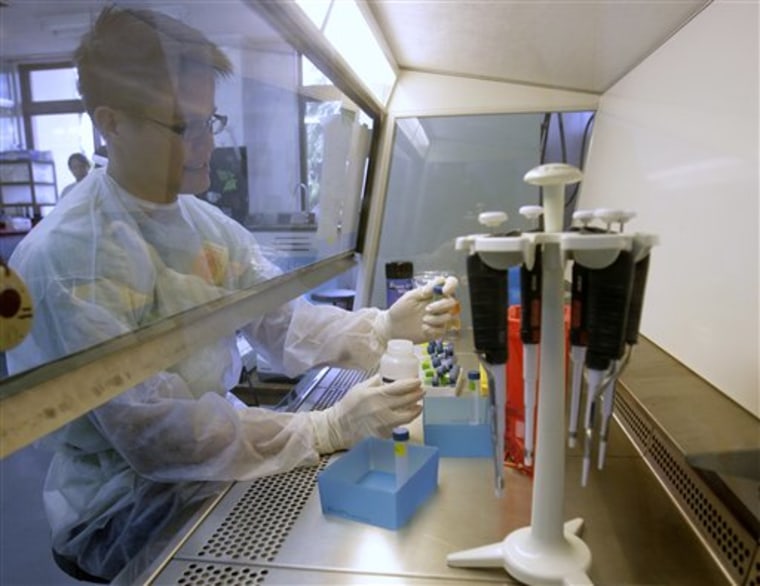The H1N1 flu strain has not yet taken hold outside the Americas region, but the outbreak is serious and requires close monitoring, a World Health Organization official said on Thursday.
Keiji Fukuda, acting WHO assistant director-general, said the United Nations agency was maintaining its pandemic alert at the second-highest notch of 5 despite the virus having caused more than 6,000 infections in 33 countries.
"If we see changes in the severity we will let the world know about that," he told a news conference. "This is an event that is serious and that requires close monitoring."
The Phase 5 designation means a pandemic is imminent.
Leading vaccine makers including GlaxoSmithKline, Sanofi-Aventis, Novartis and Baxter International are awaiting guidance from the WHO about whether to start manufacturing vaccines for a pandemic instead of seasonal flu.
Vaccine experts convened by the WHO on Thursday did not reach a firm conclusion about whether such a switch should take place, or whether the H1N1 strain should be included in the mixture of the seasonal flu jab, Fukuda said.
"There will be additional meetings," he said after that teleconference drawing together pharmaceutical representatives and health officials, which he said ended with "no big decisions, no pronouncements."
Most flu vaccine companies can only make one vaccine at a time: seasonal flu vaccine or pandemic vaccine. Production takes months and it is impossible to switch halfway through if health officials make a mistake.
Vaccine makers can make limited amounts of both seasonal flu vaccine and pandemic vaccine — though not at the same time — but they cannot make massive quantities of both because that exceeds manufacturing capacity.
‘Seed stock’
Because seasonal flu kills up to 500,000 people a year, health officials have been calling for the continued production of vaccines for at-risk people including the elderly, pregnant women, and people with other health conditions like asthma.
WHO estimates that up to 2 billion doses of swine flu vaccine could be produced every year, though the first batches wouldn't be available for four to six months.
The U.S. Centers for Disease Control and Prevention is currently working on a "seed stock" to make the vaccine, which should be ready in the next couple of weeks. That will be distributed to manufacturers worldwide so they can start producing the vaccine.
Until vaccine manufacturers get the seed stock, they won't know how many doses of vaccine they can make or how long that would take. Sanofi Pasteur, the world's biggest vaccine producer, said Thursday it is waiting for the green light from WHO before it starts making swine flu vaccine.
WHO is also negotiating with vaccine producers like GlaxoSmithKline PLC to save some of their swine flu vaccine for poorer nations. Many rich nations like Britain, Canada, Denmark, France, Switzerland and the United States signed deals with vaccine makers years ago to guarantee them pandemic vaccines as soon as they're available.
A WHO medical officer told reporters earlier this week that at-risk groups should also have priority in the distribution of antiviral drugs that have been shown to work against the H1N1 strain, which is a mixture of swine, bird and human viruses.
But Fukuda stressed on Thursday that the WHO did not plan to alter its guidance on when and whether to prescribe antivirals like Roche's Tamiflu or GlaxoSmithKline's Relenza, saying this was at countries' discretion.
"WHO is not making any changes in its recommendations on antivirals," he told the news conference.
The United Nations agency has convened an intergovernmental meeting about the sharing of flu virus samples — which vaccine makers need to formulate the ingredients of jabs -- at its Geneva headquarters on Friday.
The flu and global needs for antiviral drugs and pandemic vaccines are also expected to dominate next week's World Health Assembly, an annual meeting that will draw top health officials from around the world to Geneva.
According to the latest WHO tally, 65 people have died from infection with the H1N1 virus, which remains most prevalent in North America. Evidence that the flu is spreading in a sustained way in Europe, Asia or elsewhere would cause the WHO to raise the pandemic alert to the top level of 6.
As of Thursday, at least 33 countries reported more than 6,600 cases of swine flu worldwide, with 69 deaths. According to WHO's pandemic alert level, the world is at phase 5 — out of a possible 6 — meaning that a global outbreak is "imminent."
"It's a no-brainer," Fedson said of the decision to make swine flu vaccine. "All that's being discussed now is the details of how to make sure you have enough seasonal flu vaccine and the logistics of making the switch to H1N1 vaccine production."
